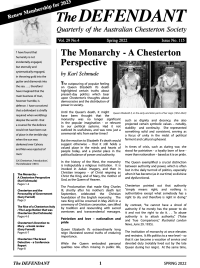
Gary Furnell (pictured) is a former librarian and occasional writer whose latest book is The Hardest Path is the Easiest: exploring the Wisdom literature with Pascal, Burke, Kierkegaard and Chesterton (Connor Court, $29.95). He is Secretary-Treasurer of the Australian Chesterton Society.
His reflections on the types of government formed part of a longer article, “Personal Policing, Personal Government,” which was published in News Weekly, June 25, 2022, and is reprinted with the kind permission of the Editor, Peter Kelleher.
Chesterton observed that there are two types of government: personal and impersonal.
Monarchy is an obvious and direct form of personal government. When the Church observes the Feast of Christ the King, it is celebrating the ultimate form of personal government.
Constitutional monarchies are a weakened but still vital form of personal government.
A strictly secular republic is an example of impersonal government; laws and edicts are the primary means of control no matter who is actually in power at any given time.
The European Union — its clumsy parliament notwithstanding — is another example of impersonal government, with a distant, unaccountable and anonymous bureaucracy imposing arcane regulations.
Impersonal governments tend to drift towards an ersatz of personal government by developing a surrogate. For example, France has the Marianne figure. Other republics develop a cult around the president or dictator.
Broadly speaking, people prefer personal government to impersonal government. People identify with a king or queen more readily than with a political system. The reason is obvious: a royal family has babies, weddings, illnesses, hardships, birthdays and bereavements like we do.
Another benefit of a royal family—even when their role is largely ceremonial or social—is that they remind people of shared values and customs. This is one worthy characteristic of the long reign of Queen Elizabeth II.
In the 1930s, Chesterton wrote about the good things in England (and by extension the Commonwealth) that King George V helped to preserve simply by being above fads and fashions – especially at a time when social changes were at least as influential as political changes.
It was an era like ours, when long-established customs, roles, values and manners were being upended to serve impulsive minorities who had social power.
Big businesses, celebrities and non-government organisations (NGOs) led the charge with too many imprudent politicians following up with silly laws.
In one of his later essays, Chesterton wrote:
“In the things that matter most at the moment, King George most definitely has a policy: a policy of despising fantastic luxury and indiscriminate innovation; of preserving the old social sanity which used to be counted specially English…
“It has probably made a vast difference that the first family in the nation has been so firmly fixed on that foundation. It has made it impossible for moderation and modesty and common sense in custom and costume to die out in the lower middle classes as things entirely dowdy and discredited …
“Monarchy has taken on again something of its ancient leadership in matters that were once counted light and trivial, but which have become, in this strange season and in the eyes of all the wise, very weighty.
“In many vital ways, the King has been able to represent all that society that is outside Society. He had had to be the protector of something at once huge and hidden; to represent the normal when the abnormal is more in evidence; to defend a mob of inarticulate decencies that cannot defend themselves…
“It is well when the central institutions or individuals of a society represent all the neglected normality.
“The popularity of King George will stand at least as a sort of solid reminder of the proportion of things; will tell the world that we are not all divorced; that we are not all degenerates; that we are not all pestering the world with crazy philosophies and aesthetic versions; that human life can in sober reality really be lived; and as the royal sage added, with a noble irony: ‘Life can be lived well even in a palace.’”
Come to Think of It, 1930
